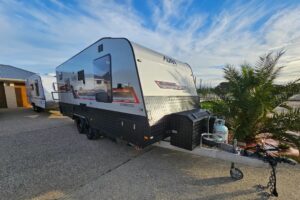Caravans are the ultimate holiday homes on wheels. Gone are the days of cramped sleeping arrangements and primitive campsites – caravans for sale in Australia look more like boutique hotels than family vans, with everything you need for a comfortable, carefree getaway. Regular caravan servicing will keep you safe and save you money in the long run. For more information about KompaqCaravans caravan repair Adelaide, click here.
Caravan Service Adelaide
 Caravans are a significant investment, so keeping them well-maintained is essential. Regular caravan servicing helps to ensure your caravan stays safe on the road, protects your investment and can also help with resale value. Caravan owners should always contact a professional mobile caravan service in Adelaide. They can help you with all your maintenance and repair needs.
Caravans are a significant investment, so keeping them well-maintained is essential. Regular caravan servicing helps to ensure your caravan stays safe on the road, protects your investment and can also help with resale value. Caravan owners should always contact a professional mobile caravan service in Adelaide. They can help you with all your maintenance and repair needs.
Maintenance
A caravan service is a great way to keep your caravan in tip-top shape. It will identify minor problems before they become big and save you money in the long run. It will also ensure that your caravan is roadworthy and safe to travel.
A good service will include a thorough inspection of the chassis and suspension and the wheels, tyres, and brakes. The mechanic will check the tyres for proper pressure and wear and any cracks or damage. They will also check the battery and electrical system to ensure they work correctly.
Caravan owners should also regularly clean their vans and inspect the seals, hinges, and connections for signs of wear or rust. Taking the time to do these maintenance tasks will make your trips much more pleasant. Bringing a tool kit to perform minor repairs when necessary is also a good idea. For more information about KompaqCaravans caravan repair Adelaide, click here.
Repairs
Caravans and camper trailers are a home away from home on the road, so keeping them in peak condition is essential. Regular caravan servicing can reduce the likelihood of unexpected breakdowns and repairs and make your next trip more enjoyable.
It’s essential to check the water tanks before every trip and drain them thoroughly. This helps to sterilise the tanks and prevent contamination by stagnant water. It’s also essential to flush the sewage tank before leaving.
Other checks include checking the awning for cracks and damage ensuring it extends and retracts smoothly. Also, a visual inspection of the connections and wires in the van is necessary. It’s also worth considering bringing a caravan tool kit for quick repairs.
The biggest concern among caravanners is delamination, which occurs when the layers of fibreglass separate from each other. This can lead to severe damage, so any signs of delamination must be repaired immediately.
Insurance
Whether you are a full-time or only use your caravan during holidays, the need for adequate insurance protection is unquestionable. Considering your caravan is your home away from home, it deserves to be protected against unexpected events that could turn your holiday into a nightmare.
Caravan Insurance protects your caravan against damage caused by storms, fire, theft, vandalism, etc. It also provides emergency accommodation cover, a lifetime repair guarantee for repairs authorised by QBE and much more.
Before purchasing this insurance, we recommend you consider the Product Disclosure Statement on this website. This document contains important information about the policy, including the terms, conditions and exclusions. Please read it before deciding to buy this policy. This is important as a claim may affect your premium at renewal. For more information about KompaqCaravans caravan repair Adelaide, click here.
Storage
It’s well-known that caravans and their fittings are susceptible to moisture. Moisture can enter through the merest gap, causing rot and damage. Australia’s harsh sunlight is another major enemy. Constant exposure to UV rays causes plastic and rubber seals to fade over time. This continuous deterioration of fittings erodes the value of your caravan.
Before you store your caravan:
- Ensure it’s clean and dry inside and out, especially if you have travelled in dusty or salty environments.
- Check the smoke alarms and replace their batteries if necessary.
- Disconnect the battery and drain all water tanks.